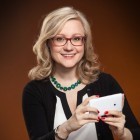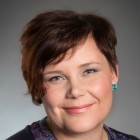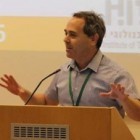OEB Boardroom Sessions 2016
BRD01
Date Thursday, Dec 1 Time – Room: Zille
Are Senior Citizens Forgotten in Social Media? A Knowledge Exchange on e-Inclusion Practices
More and more seniors need to use and are interested in using social media and technology. What content, methods and techniques do they prefer to improve digital skills? This boardroom will focus on their needs, and on how we can ensure citizens young and old will be included in our digital age.
Topics that will be discussed cover questions such as: how are elderly people seen in social media in different countries? What are problems if a large part of elderly citizens do not use social media? How can NGOs support this group better? And how can educators support peer-to-peer learning for this group? Can digital games be appropriate motivational tools?
Moderators

Ida-Maria Pankka
Project Planner, LähiVerkko Project, Finland
I love history, I love to read. I have studied cultural history, education theory and religious studies. I love the stories behind people. I love to see people find and grow. That’s why I’m a teacher. That’s why I have worked as a director of childhood education and as a trainer in adult education. Now I work as a project planner in a project for retired people.
Learning new things and skills is not confined to a classroom. I’m an advocate of continuous learning irrespective of place. As an educator I want to help people see that they can learn, and that they have the tools for it inside of them; even when they are 90 years old.
Links

Riikka Marttinen
Web based educator, LähiVerkko Project, Finland
Web service developer who loves to learn new things, play digital games and find new technology solutions for people with all ages and abilities.
My work consists two different projects. Every other week I do preventive social and educational work with children and youth by chatting and playing games in social media and web. Every other week I try to find new ways how technology and social media could help elderly people in their daily life.
I'm a occupational therapist. My experties are mobile devices and social media in education and rehabilitation. I'm convinced that people with all ages can learn, use technology and play digital games if they are educated, supported and encouraged to do so. Technology should be easy to use for everybody and modified by users needs. Games, social media apps and other software can signicantly increase happiness and social life.
Links
BRD02
Date Thursday, Dec 1 Time – Room: Zille
Owning Learning: the Learning Solution Designer Profile Perspective
The means for gaining mastery in the learning and development profession and its role in learning organisations of today and tomorrow will be in focus in this session.
The facilitator sets the scene with research findings and guides the discussion around questions such as: What is the skill set required from the learning designer in order to meet his/her goals? How does one gain the desired skills, knowledge and experience? How can a learning solution designer maintain his skill set over time? How can we as managers support and promote learning designers` ongoing quests for proficiency?
The goal will be for each of us to gain insights into the sustainability of our respective profiles and the means to support these over time.
You are invited and encouraged to contribute based on your professional, cultural and organisational experience.
Moderator

Eran Gal
Owner, Holon Institute of Technology, Israel
Dr. Eran Gal is an e-learning expert with over 17 years of experience in applying cross-company technology-based learning solutions. Dr. Gal holds both M.A. and PhD degrees from the Knowledge Technology Lab at the Tel Aviv University, School of Education. Following several years as an e-Learning manager in large enterprises Dr. Gal joined the Holon Institution of Technology (HIT), Faculty of Instructional Technologies as a lecturer and a research team leader.
BRD03
Date Thursday, Dec 1 Time – Room: Zille
Formative Assessment Strategy in an Online Setting
How can higher education institutions successfully design and implement a formative assessment strategy for their online courses? Based on a research project, this boardroom exchange session aims to bring together colleagues to discuss best practices, experiences and recommendations for course design.
What are some examples of formative assessment strategies and of summative assessment strategies you have used?
How does giving and receiving feedback to students connect to one’s pedagogy in face-to-face as well as online classes?
How does either one of the assessment or feedback considerations made earlier relate to instructional design for face-to-face and online courses? And how does one balance assessment and feedback in an integrative manner to ensure adequate student learning and development?
Share your views and experiences in this constructive conversation!
Moderator

Marius Boboc
Vice Provost for Academic Planning; Department Chair; Professor, Cleveland State University, USA
Dr. Marius Boboc is Professor of Education and Vice Provost for Academic Planning at Cleveland State University (CSU) in Cleveland, OH. Marius earned his M.A. in Teacher Leadership from Roosevelt University in Chicago, and his Ed.D. in Curriculum and Instruction from the University of Northern Iowa in Cedar Falls. His work experience includes being the Director of the Office of Student Learning Assessment at CSU, chair of the Department of Curriculum and Foundations, and overseeing the Office of Academic Planning, where he manages strategic planning, student learning assessment, academic program review and institutional research and analysis, e-Learning, as well as Instructional Technology and Distance Learning, among many other responsibilities. Marius’ research interests relate to online instruction (ranging design to implementation and evaluation), assessment and accreditation in higher education, postmodern education, leadership in higher education, and teacher preparation reform.
Links
BRD04
Date Friday, Dec 2 Time – Room: Zille
Initiatives for Displaced Populations to Own Learning
Education, certification of existing skills and competencies, and introductions to relevant networks can be crucial for successful integration into a host society.
Join this boardroom with a panel of experts to discuss how quality, digital, inclusive, and culturally appropriate content can offer support for displaced populations. Discuss and discover which technologies and modes of delivery fit with challenging circumstances. Also, find out how projects get stakeholders on board; from national and local authorities to businesses, individuals and targeted users.
Moderators

David Banes
Director; Access Technology Evangelist, Consultant working with The Qatar Foundation International for “Build Back Better”, UK
Director of David Banes Access and Inclusion Services and formerly CEO, at the Qatar Assistive Technology and Accessibility Center, David has developed services ensuring the digital inclusion of disabled people. He works across Middle East and Europe to address how access is maintained during periods of technical and social change, seeking to build capacity, linking awareness, policy, technology development and the need for training.
With a background in special needs education and supporting digital inclusion in Europe, he supports emerging access ecosystems promoting cooperation between states, supports development of accesisble technology solutions and content.
Recent work includes a framework for contextualisation of access technology, transference of knowledge across communities and a policy framework to address the rights of people with a disability. His current activity includes educational support for refugees and the disruptive innovation upon the access industry.
Links

Vincent Zimmer
Co-founder & Managing Director, Kiron Open Higher Education gGmbH, Germany
Vincent Zimmer is a Co-Founder of Kiron Open Higher Education, a blended learning educational platform for refugees. He completed two master’s degree study programmes, “International Economics” at the Georg-August-University Göttingen and “Public Policy and Administration” at the London School of Economics. Vincent Zimmer has a lot of experience in the startup area, and has been already involved in several foundings. Furthermore he worked in a consultancy (Rambøll Management Consulting) and with students in crisis during his time at “Study without borders”. His experiences in the refugees area and a research stay in Istanbul, moved him to found Kiron together with Markus Kressler in 2015.
Links
BRD05
Date Friday, Dec 2 Time – Room: Zille
Multimodal Interaction and Personalised Learning
Multimodality can enrich the learning process, make some tasks easier and information accessible for us all while it helps people with different learning styles, special needs, learning difficulties and disabilities. In many cases digital technology can make things possible that were previously impossible. Thus, multimodality is the extension of digital technology into new modalities of interaction that make new possibilities viable. Come and share your experiences and ideas around multimodality and learning.
Legal and human rights will set the scene at this table for multimodality and accessibility. Educational equity does not sufficiently materialise for those with learning difficulties and different abilities. In addition to individuals with special needs, a growing number of young people are reluctant to read and write long texts, stories or books. Which way could we increase equality, motivation and access for learning with digital literacy and with multimodality for those who struggle with texts?
Shall we see the current cultural, technological and social changes shaking traditional position of reading and writing skills as the corner stones of our western society? What kind of signs are present already today? Could we address some learning difficulties, foster educational equity and prepare a new kind of citizenship by making our society and information more accessible by widening traditional ways of understanding, creating and sharing information, creating new knowledge and setting frames for working life with multimodality, multimodal interaction and digital literacy? As the digital revolution shakes society and its structures in many ways, could it also have positive side-effects as increasing accessibility for society?
In this OEB Roundtable, Multimodality and Learning, we'll hopefully learn how the use of multimodality and multimodal interaction is being met internationally. What kinds of multimodal solutions have been developed for accessibility for various stages of the learning process and for the transition period from upper secondary education to higher education or to the labour market? It will be great to hear what you have found in this area all around the world!
Moderator

Merja Saarela
Principal Lecturer, Research Group Leader in Multisensory and Assistive Technology (MATEC), Häme University of Applied Sciences (HAMK), Finland
Dr. Saarela has worked at Häme University of Applied Sciences as a Principal Lecturer for more than 17 years. She is currently a Research Group Leader in Multisensory and Assistive Technology that promotes learning, working, and working capability. Currently her particular areas of interest concern multimodal interaction and how use of other senses than the visual can be used in applications and services. Dr. Saarela is specialized in social-neurocognitive learning difficulties (especially learning difficulties caused by developmental disabilities, dementia, sensory deficits), interaction, learning and knowledge assessment and education evaluation. In addition, Dr. Saarela has broad experience in developing innovative learning methods and innovation education. She is also specialized in user-centered wellbeing and education technology, assistive technology, gaming, action and interaction platforms.
